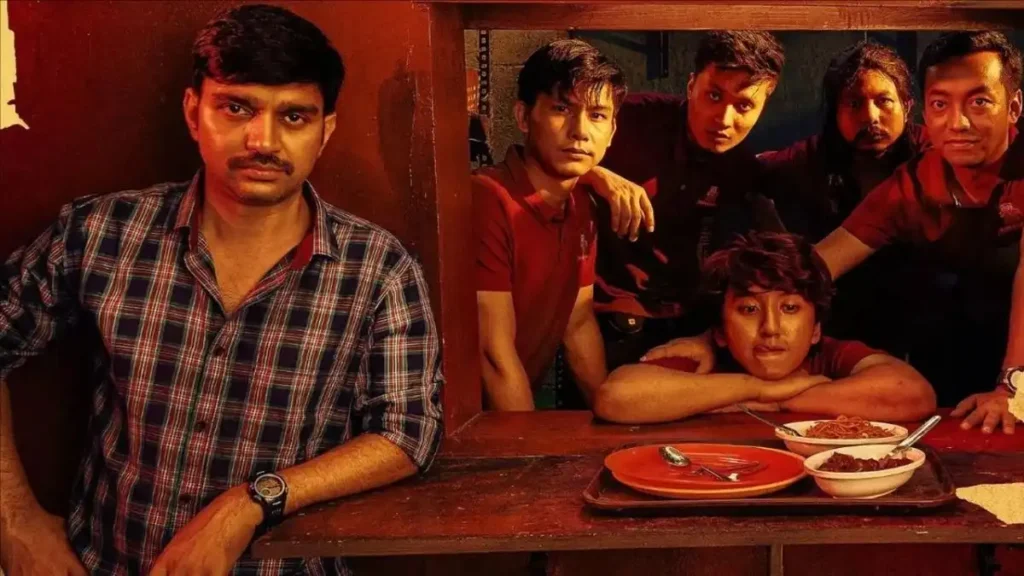The impressive thing is that a number of messages about assimilation and discrimination are put across without making it seem like a Message Movie.
There are hardly any films that talk about people from the Northeast. Nicholas Kharkongor’s 2019 dramedy Axone was one. It centred on a group of migrants from Northeast India in Delhi, and their efforts to make a local (i.e. Northeastern) dish whose strong smell was offensive to neighbours. Without being preachy, and with a dash of comedy, the story spoke about how we treat minorities, especially when they are migrants. Prateek Prajosh’s Chilli Chicken is a similar narrative, but set in Bengaluru. A bit of text at the opening tells us that the city is home to India’s second-largest migrant community, accounting for 51% of the city’s population. Among these, approximately 700,000 individuals are from the Northeastern states of India. We focus on four individuals: Khaba, Ajoy, Jimpa, and Jason, played by Bijou Thaangjam, Victor Thoudam, Jimpa Sangpo Bhutia, and Tomthin Thokchom.
They work at a second-rate hotel called Noodle House, whose manager is Adarsh (Shrunga BV plays him with the exact mix of dreams and desperation). The man has set his sights high. He wants a classy restaurant named Noodle Palace. Like his employees who have come to this city for a better life, he, too, wants an upgrade. Chilli Chicken begins on an existential note, with a voiceover asking: “What is the value of life? Do we realise it when we are born or when we die?” Ultimately, this proves too heavy a thesis point for a series of events that’s content to exist in a shallower playing field. (And there’s nothing wrong with that.) The impressive thing is that a number of messages about assimilation and discrimination are put across without making it seem like a Message Movie. The director has a light but sure hand, and despite a few bumpy passages, he steers the material across confidently.
The first half of the film is devoted to world-building, character-building. In these days of hectic cutting, it is a relief to be able to sink deeply into Adarsh, Khaba, Ajoy, Jimpa, and Jason, and truly understand their behaviours and motivations. Take the touch that Khaba, Ajoy, Jimpa, and Jason – all speak Kannada. It doesn’t come across like a compromise in order to avoid subtitles, had they spoken in their own languages from the Northeastern states. It looks like they have been in Bengaluru for a while, and have picked up the language. Another lovely touch is Ajoy’s relationship with a Bengaluru woman named Anu (an excellent Harini Sundararajan). There’s no fuss made about the fact that he is from somewhere, she is from somewhere else. They are just a man and a woman. The only discriminator, if you will, is their gender. All these characters are treated with great tenderness and no one slips into caricature.

Even when their landlady gently refuses to allow them to use her kitchen (like in Axone, she probably fears the food that is going to be cooked), she is not cast in the mould of an outright bigot who’d, say, hang a sign that said “room for rent; only vegetarians allowed”. She feels like someone from a particular generation who has grown up with a set of values, right or wrong, and is trying her best to exist in a changing world that mocks those values. The Northeastern guys don’t protest about being denied the use of the kitchen. They probably believe that if you want a rainbow you have to tolerate the rain. That, incidentally, is the message inside one of the fortune cookies at Noodle House. Even after an ugly incident instigated by a really bigoted neighbour (the only truly horrible character), the four men decide to make some pudding. There’s no angst. They keep finding ways to be happy.
In order to get money to go from Noodle House to Noodle Palace, Adarsh tries everything. He hopes that his rich girlfriend’s father will give him the money. He hopes that a female don (delightfully played by Padmaja Rao) will help. And then, someone dies, and the film’s tone changes. There’s more infighting, and the dramatic stakes escalate. But even when the tone changes, the tonality doesn’t. The storytelling remains gentle. After the death, there is no big, melodramatic outpouring of grief. Major points are made with minimal fuss, like the fact that there are only two possible jobs for men from the Northeast: making “Chinese food” or working as the security guard at a residential complex. A mild dash of newspaper politics is present, too. Ajoy’s cousin says he almost joined ULFA, but he then came to realise that people have to fight for their own justice.
Chilli Chicken is a solid debut film, and its modest charms should play perfectly on the small screen. The way Adarsh receives his lesson, the way the Northeasterners get the respect and equality they crave for (with a bit of violence), the way various dishes and festivals from the Northeast are showcased – everything adds up to a tidy little tale of tolerance. If there’s a complaint, it’s that some plot points aren’t explored to the extent you’d hope. And I really wish films would stop using this trope of one tweet or one podcast going viral and changing everything. But Chilli Chicken is so filled with heart and good performances that these reservations are easily brushed aside. The film makes us see how confusing and complicated India is. Not only do we have separate states with separate languages and dialects, we also have the intermingling of cultures brought about by urban migration. The film is proof that messages are so much more easily absorbed when they aren’t thrust down our throats.



Pingback: Prateek Prajosh’s ‘Chilli Chicken’, now on Prime Video, is a solid drama about Northeasterners in Bengaluruli | Baradwaj Rangan